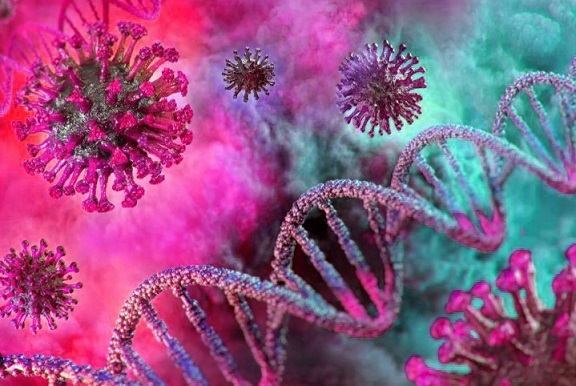Viral Epigenetic Tricks Could Be the Hidden Driver of COVID-19 Severity and Long COVID
Nikhil Prasad Fact checked by:Thailand Medical News Team Sep 23, 2025 4 months, 3 weeks, 9 hours, 32 minutes ago
Medical News: How SARS-CoV-2 Alters Human Genes Without Changing DNA
A new international review led by researchers from the Centre for Interdisciplinary Sciences, JIS Institute of Advanced Studies and Research, JIS University in India, and the Department of Medical Laboratory Technology, Faculty of Applied Medical Sciences, Taibah University in Saudi Arabia, has revealed how the coronavirus uses “epigenetic tricks” to alter the body’s immune defenses. These hidden changes may explain why COVID-19 varies so much in severity between individuals. According to this
Medical News report, epigenetics refers to chemical switches that turn genes on or off without altering the DNA sequence itself. The study shows that SARS-CoV-2 hijacks these mechanisms, reprogramming human cells to favor its own survival while weakening the host’s immunity.
 Viral Epigenetic Tricks Could Be the Hidden Driver of COVID-19 Severity and Long COVID
What Are Epigenetic Changes and Why They Matter
Viral Epigenetic Tricks Could Be the Hidden Driver of COVID-19 Severity and Long COVID
What Are Epigenetic Changes and Why They Matter
Epigenetic changes act like a volume control for genes, deciding whether they should be loud, silent, or somewhere in between. In COVID-19 patients, scientists observed modifications such as DNA methylation, histone acetylation, and chemical changes to RNA. These shifts affect how cells respond to infection. For example, the ACE2 receptor—the “door” the virus uses to enter cells—can be more or less active depending on DNA methylation levels. Older people often show reduced methylation at this site, making them more vulnerable. Meanwhile, the virus manipulates histone proteins that normally help regulate immune activity, silencing key antiviral defenses.
Key Findings of the Review
The study highlights several striking discoveries:
-
DNA methylation changes: SARS-CoV-2 infection reduces normal methylation patterns, leading to overactivation of inflammatory genes. This may explain why severe cases involve cytokine storms and lung damage.
-
Histone modifications: The virus tampers with histone proteins, reducing the body’s ability to launch fast interferon responses that block early infection.
-
RNA chemical changes: Viral RNA carries “molecular disguises” like m6A and m5C modifications, which help it avoid detection and destruction by the host immune system.
-
Non-coding RNAs: Small molecules like microRNAs are altered during infection, sometimes helping the virus replicate while silencing protective immune signals.
These discoveries show how SARS-CoV-2 uses epigenetic reprogramming as a survival strategy. Instead of mutating the host’s DNA, it subtly tweaks the cellular control system, allowing the virus to replicate and spread undetected.
Why This Matters for Future Treatments
By uncovering how COV
ID-19 reshapes our genetic switches, researchers believe new therapies can be designed to reverse or block these changes. Drugs that target enzymes controlling methylation, histone modification, or RNA regulation could restore normal immune defenses. Such treatments may not only help current COVID-19 patients but also prepare humanity for future viral outbreaks that exploit similar tactics.
Drugs That Could Reverse Viral Epigenetic Tricks
The review also explored drugs already known in medicine that may be repurposed to interfere with these viral manipulations:
-Nsp1 blockers like glycyrrhizinic acid and lobaric acid may restore normal protein production in host cells.
-Nsp3 inhibitors such as mycophenolic acid destabilize viral enzymes that block immune defenses.
-Protease inhibitors including nirmatrelvir (Paxlovid), chloroquine, and elbasvir not only reduce viral replication but may also stop the virus from silencing interferon genes.
-RNA polymerase inhibitors like remdesivir and molnupiravir target nsp12, helping reverse epigenetic reprogramming of mucosal immune cells.
-Helicase inhibitors such as itraconazole and saquinavir restore immune checkpoints critical for interferon signaling.
-Accessory protein blockers like amantadine and rimantadine may interfere with viral ion channels that fuel inflammation.
-Nutritional compounds including vitamin B12 and folic acid were noted to prevent viral hijacking of host transcriptional regulators.
These drug candidates highlight that treatments for COVID-19 may not only involve attacking the virus directly but also “resetting” the genetic switches it corrupts.
Conclusion
The findings underscore that COVID-19 is more than just a viral infection—it is a sophisticated battle between viral stealth strategies and human cellular defenses. Understanding epigenetic manipulation opens a new frontier for treatments that go beyond vaccines and antivirals. If scientists can reset these disrupted gene switches, it may be possible to prevent the severe complications that have claimed millions of lives worldwide.
The study findings were published in the peer reviewed journal: Frontiers in Immunology.
https://www.frontiersin.org/journals/immunology/articles/10.3389/fimmu.2025.1596135/full
For the latest COVID-19 News, keep on logging to Thailand
Medical News.
Read Also:
https://www.thailandmedical.news/news/study-finds-that-long-covid-linked-to-accelerated-aging-and-epigenetic-changes
https://www.thailandmedical.news/news/covid-19-causes-genetic-changes-that-leads-to-fatigue,-breathlessness-and-cardiovascular-issues
https://www.thailandmedical.news/news/breaking-covid-19-news-israeli-and-american-study-shows-epigenetic-changes-occurring-with-elevated-a-to-i-rna-editing-in-covid-19-infected-individuals
